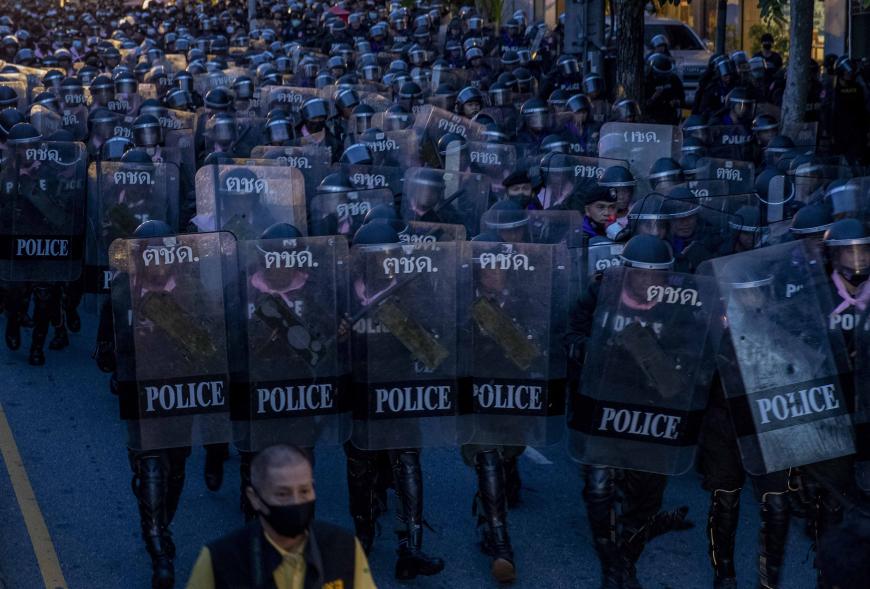The ICJ today published a legal briefing analyzing the implementation of Thailand’s Emergency Decree on Public Administration in Emergency Situation B.E. 2548 (2005) in response to protests in 2020.
The ICJ welcomed the Thai government’s decision on 22 October 2020 to lift the Serious Emergency Situation in Bangkok but said the longstanding Emergency Decree of 2005 and emergency measures taken recently are non-compliant with Thailand’s international human rights obligations.
The legal briefing looks at restrictions in law and practice that were imposed under the Decree between 15 and 22 October 2020, after the “serious emergency situation” was declared by Thailand’s Prime Minister, in light of international human rights law.
The ICJ in the legal briefing recommends that Thailand should remove the criminal liability for the protesters who are prosecuted or at risk of prosecution under the Emergency Decree for merely exercising their rights to freedom of expression and assembly as guaranteed under international and Thai law.
During the protests between 13 and 22 October 2020, at least 90 people, including protest leaders, have reportedly been arrested, mostly for violating the Emergency Decree.
The ICJ urges Thailand to ensure that affected populations shall have access to judicial remedies in respect of alleged violations under the emergency laws. The regulations, notifications, decisions and actions of officials exercising powers under the emergency law during the “serious emergency situation” must be subject to review by the courts, and ensure the affected persons’ right to access to an effective remedy.
The legal briefing also underscores the need for Thailand to repeal and amend several provisions of the Emergency Decree.
The legal briefing focuses on four primary areas of concern, namely:
- the emergency power;
- the limited scrutiny by the courts;
- legal immunity from prosecution; and
- emergency decree measures.
Thailand is still under a nationwide state of emergency as part of the COVID 19 restrictions.
Background
On 15 October 2020, Thailand’s Prime Minister invoked the Emergency Decree declaring a “serious emergency situation” in the areas of Bangkok in response to the student-led anti-government protests that took place between 13 and 15 October 2020. Protesters called for the Prime Minister’s resignation, constitutional amendment and reform of the monarchy.
The Prime Minister, General Prayuth Chan-ocha, claimed that the declaration of the serious emergency situation was necessary to “end the situation in an efficient and prompt manner, to ensure compliance with the law, and to sustain national order and public interest”.
The restrictions included: prohibition of a gathering of five or more people, dissemination of publications or any means of communication containing texts which intend to distort information and instigate fear among the population. The competent officials, who may not be law enforcement officials, are, among other powers, authorized to arrest and detain persons suspected of having a role in causing the emergency situation, or being an instigator, a propagator, a supporter of such act or concealing relevant information relating to the act which caused the emergency situation; summon any person to report to the competent official; seize or attach arms, goods, consumer products, chemical products or any other materials; and prohibit any act or any instruction to perform an act to the extent that is necessary for maintaining the security of the state, the safety of the country or the safety of the population.
Nevertheless, protests in Thailand have continued despite government ban and efforts by the authorities to prevent them. On 16 October 2020, it was reported that polices forcibly dispersed peaceful protesters at Pathumwan intersection in Bangkok in which thousands of people, including many students, took part. Officials forcibly dispersed the protestors by using water cannons – which, according to the UN Guidance On Less-Lethal Weapons in Law Enforcement, should only be used in situations of serious public disorder where there is a significant likelihood of loss of life, serious injury or the widespread destruction of property. The water was laced with blue dye and an undisclosed chemical irritant to drive back protesters.
The state of serious emergency situation in Bangkok was lifted on 22 October 2020 by the Prime Minister, saying that the situation had eased and the violence was at an end.
In the legal briefing, the ICJ expressed concerned that the emergency declaration in response to the protests had activated provisions of the 2005 Decree that remain non-human rights compliant. The Decree has been used to impose a blanket restriction on freedom of expression and assembly by imposing a general ban on peaceful public demonstrations.
Download
Legal Briefing in English and Thai.
Further reading
More Power, Less Accountability: Thailand’s New Emergency Decree, August 2005
Implementation of Thailand’s Emergency Decree in Thailand’s Three Southern Provinces, July 2007

